Found 123 resources.
0
0
0
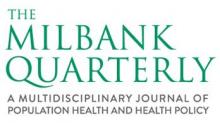
Poor maternal and child health (MCH) outcomes and rates of chronic disease are persistently high in the United States and concentrated in rural and service-deprived areas where local health departments provide most care. In a new Milbank Quarterly study, Taryn A. G. Quinlan, Amelia L. Mitchell, and Glen P. Mays of the Colorado School of Public Health use national survey data from 630 local health departments to understand the relationship between social service collaboration and the provision of direct MCH services, such as the Special Supplemental Nutrition Program for Women, Infants, and...
Topics: dual-generation initiative, Early childhood, Health, Low-income, Partnerships, Research
 Shared by Sandra Ware
on Feb 7, 2023
Shared by Sandra Ware
on Feb 7, 2023 0
0
0
Looking largely at the 2020-2021 school year, the report is chock-full of information about how schools apply research-based strategies in a variety of different contexts – from very different school systems across multiple states – to make research translate into positive experiences and outcomes for students and their teachers in three critical areas:
• Instructional work, where math or English-language-arts teams, including instructional coaches, special-education teachers, and English learner/multilingual teachers, work to improve the quality of instruction within classrooms.
• Early...
Topics: Advocacy, Attendance, Child welfare, CLPHA, Community development, Education, Grade-level proficiency, Housing, Literacy, Low-income, Partnerships, Place-based, Supportive housing, Sustainability, Youth
 Shared by Karina George
on Jun 29, 2022
Shared by Karina George
on Jun 29, 2022 0
0
0
Innovative public housing authorities (PHAs) are collaborating with college access partners and community colleges to increase postsecondary educational achievement for low-income residents and college students experiencing homelessness. This report elevates 11 shared learnings from a recent convening of these five pioneering PHAs and their postsecondary collaborators, and offers a series of recommendations to policy makers, PHAs, and philanthropic organizations seeking to develop emerging cross-sector collaborations between housing and education organizations. The report also includes an...
Topics: CLPHA, Education, Housing, Legislation & Policy, Low-income, Partnerships, Post-secondary, Stability
 Shared by Abra Lyons-Warren
on Oct 6, 2020
Shared by Abra Lyons-Warren
on Oct 6, 2020 0
0
0
How Housing Programs Can Support the Educational Needs of Children Living in Publicly Supported Homes
Topics: Attendance, Broadband, Child welfare, Early childhood, Health, Housing, Literacy, Low-income, Out-of-school time, Partnerships, Place-based, Research, School-readiness
 Shared by Kelly McElwain
on Nov 7, 2019
Shared by Kelly McElwain
on Nov 7, 2019 0
0
0

Trends in Housing Assistance and Who it Serves
Topics: Community development, Disabilities, Education, Funding, Health, Homelessness, Housing, Legislation & Policy, Low-income, Partnerships, Research, Seniors, Workforce development, Youth
 Shared by Keely Stater
on Sep 10, 2019
Shared by Keely Stater
on Sep 10, 2019 0
0
0
CLPHA’s Education Working Group convened on Tuesday, June 11 to learn about one of the Housing Authority of Kansas City’s (HAKC) newest housing communities: Pemberton Park, a subsidized apartment building that serves grandparents caring for grandchildren. Representatives from HAKC and their partners discussed the process of establishing the grand-family complex, as well as challenges and successes they experienced along the way.
Topics: Education, Family engagement, Housing, Housing Is Working Group, Low-income, Partnerships, Seniors, Youth
 Shared by Housing Is
on Jun 11, 2019
Shared by Housing Is
on Jun 11, 2019 0
0
0
It’s a prescription guaranteed to develop healthy brains, refine motor skills and prepare kids for school, doctors say. But few parents expect a physician to hand their children a book at their first wellness checkup at Nationwide Children’s Hospital in Columbus.
Topics: Child welfare, Early childhood, Education, Health, Literacy, Low-income, Partnerships
 Shared by Housing Is
on May 30, 2019
Shared by Housing Is
on May 30, 2019 0
0
0
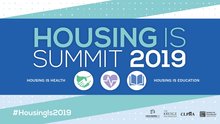
With ever-growing interest in the intersection between housing and health, researchers are evaluating the impact of cross-sector interventions. This session will bring together researchers to share insights from their work relevant to practitioners and policymakers.
Topics: CLPHA, Health, Homelessness, Housing, Low-income, Partnerships, Research, Seniors
 Shared by Housing Is
on May 24, 2019
Shared by Housing Is
on May 24, 2019 0
0
0
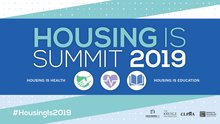
A landmark National Academies of Sciences report commissioned by Congress concludes that childhood poverty in the U.S. could be cut in half within a decade with appropriate action. The report culls through the existing evidence-base to identify the most impactful existing policies including the Earned Income Tax Credit (EITC) and housing assistance. This panel will also discuss promising new policies that if enacted could help reduce poverty such as the child allowance.
Topics: Child welfare, CLPHA, Housing, Legislation & Policy, Low-income, Partnerships, Research
 Shared by Housing Is
on May 24, 2019
Shared by Housing Is
on May 24, 2019 0
0
0
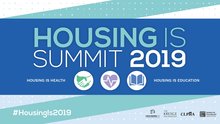
Congresswoman Barbara Lee, long-serving progressive leader and member of the Budget and Appropriations Committee, and Co-Chair of the Democratic Policy and Steering Committee, will give remarks on congressional efforts to reduce child poverty.
Topics: Child welfare, CLPHA, Legislation & Policy, Low-income, Partnerships
 Shared by Housing Is
on May 24, 2019
Shared by Housing Is
on May 24, 2019 0
0
0

Founded in 1995 as Project Women, Family Scholar House (FSH) provides comprehensive, holistic services for disadvantaged single parents, their children, and foster alumni. The nonprofit seeks to end the cycle of poverty and transform communities by empowering families and youth to succeed in education and life-long self-sufficiency. FSH provides supportive housing, educational programming, and participant advocacy to help families gain independence.
Topics: Dual-generation, Early childhood, Education, Homelessness, Housing, Low-income, Partnerships, Place-based, Post-secondary, South, Stability
0
0
0

In 2014 Caselli started Haven Connect, which is now based in Austin, to make it easier for property managers to communicate with affordable housing applicants, including those who are and aren’t homeless, and for applicants to update their information online.
Topics: Broadband, Homelessness, Housing, Low-income, Partnerships, South
 Shared by Housing Is
on Apr 16, 2019
Shared by Housing Is
on Apr 16, 2019 0
0
0
In Richmond, Virginia, an interprofessional group of health care students and faculty members is helping seniors solve problems early.
Topics: Dental, Health, Low-income, Mental health, Partnerships, Seniors
 Shared by Housing Is
on Apr 12, 2019
Shared by Housing Is
on Apr 12, 2019 0
0
0
While the program has changed very little since its inception, the need for the program has increased. In 1975, the number of program grantees stood at 594. Today, the number of grantees stands at 1,268 as more communities qualify to receive direct program allocations. Based on a CDBG Needs Survey conducted by the CDBG Coalition (and discussed later in this report), CDBG grantees have delayed and canceled projects and reduced or permanently eliminated programs because of a lack of CDBG funds. CDBG is an important investment tool for communities and neighborhoods, but program funding must...
Topics: Community development, Funding, Health, Homelessness, Housing, Legislation & Policy, Low-income, Partnerships, Research, Safety, Seniors
 Shared by Housing Is
on Apr 8, 2019
Shared by Housing Is
on Apr 8, 2019 0
0
0

The nonprofit LIFT Orlando and AdventHealth have started construction on a “first of its kind” early learning center in the long-neglected West Lakes neighborhood south of Camping World Stadium, with an opening expected by August. The center will provide basic education as well as health and wellness programs, an on-site doctor or advanced nurse practitioner, mental health counseling and other services beyond the classroom. It can enroll up to 220 children from age 6 weeks to 5 years, with half of the openings reserved for kids from the West Lakes area, who will be accepted regardless of...
Topics: Child welfare, Early childhood, Education, Health, Low-income, Partnerships, Place-based
 Shared by Housing Is
on Apr 4, 2019
Shared by Housing Is
on Apr 4, 2019 0
0
0
The Keeping Families Together model turned the usual paradigm for prioritizing affordable housing on its head. Rather than targeting the most “stable” families, Keeping Families Together sought out families with the most complicated cases—those at greatest risk. Thanks to this approach, families once on the brink of crisis now have a permanent place to call home, as well as the services and support they need to stay together.
Topics: Child welfare, Family engagement, Homelessness, Housing, Low-income, Partnerships, Research, Supportive housing
 Shared by Housing Is
on Apr 4, 2019
Shared by Housing Is
on Apr 4, 2019 0
0
0
Now colleges and universities themselves are pulling together more permanent solutions, often in collaboration with local housing authorities and non-profit partners. In some cases, colleges and universities are trying to avoid losing enrollment; not surprisingly, students in unstable living environments or who can't afford food have poorer physical health, symptoms of depression and psychological stress, and are more likely to drop out, research shows.
Topics: CLPHA, Homelessness, Housing, Low-income, Partnerships, Post-secondary, West Coast
0
0
0
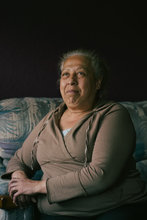
Launched in 2016, the Denver Supportive Housing SIB aims to support residents struggling with homelessness, substance use, and mental health problems by increasing the number of people getting and staying housed and reducing the number of days they spend in jail. The permanent supportive housing model combines a permanent housing subsidy with wraparound services, such as mental health counseling, to help people improve their stability. In Denver, MHCD and the Colorado Coalition for the Homeless (CCH) were selected to offer these services as part of the SIB.
Topics: Cost effectiveness, Criminal justice, Homelessness, Housing, Low-income, Pacific Northwest, Partnerships, Research, Substance abuse
0
0
0
As the population ages, one of the greatest challenges facing state officials is how to organize and pay for long-term services and supports (LTSS) for low-income elderly and disabled adults—the most complex, expensive, and fastest-growing group covered by Medicaid. To help address this challenge, a toolkit for state leaders published in 2017 has been updated.
Topics: Disabilities, Health, Low-income, Medicaid / Medicare, Partnerships, Seniors
 Shared by Housing Is
on Mar 26, 2019
Shared by Housing Is
on Mar 26, 2019 0
0
0

Kaiser is investing $200 million in low-interest loans for affordable housing nationwide. This may be part of a growing national trend of health maintenance organizations investing in housing to improve community health. In Phoenix, United Healthcare lent money to a community development corporation, Chicanos Por La Causa, to purchase apartment complexes for Medicaid recipients. In Chicago, the University of Illinois Hospital helps to find permanent housing for homeless people who regularly present at its emergency department.
Topics: Affordable Care Act, Community development, Health, Homelessness, Housing, Low-income, Partnerships, West Coast
0
0
0
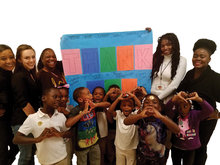
When children get sick from poor living conditions inside their rundown apartments, they miss school. And when 95 percent of students of one school live in the same apartment complex—where evictions are routine and black mold is rampant—classrooms are often left empty.
Topics: Attendance, Child welfare, Education, Health, Housing, Low-income, Partnerships, Place-based, Youth
 Shared by Housing Is
on Mar 11, 2019
Shared by Housing Is
on Mar 11, 2019 0
0
0

In 2016, the health system teamed with Spartanburg Community College and the National Center for Construction Education and Research, a nonprofit that provides global training and certification. Together, the three entities began offering construction skills training to area residents.
Topics: Asset building, Health, Low-income, Partnerships, Workforce development
 Shared by Housing Is
on Mar 11, 2019
Shared by Housing Is
on Mar 11, 2019 0
0
0
Fort Worth’s work finding housing solutions for those facing homelessness can serve as a model for the rest of the country, Housing and Urban Development Secretary Ben Carson said Wednesday during a stop in Cowtown, one of several planned in Texas.
Topics: Funding, Homelessness, Housing, Legislation & Policy, Low-income, Partnerships, South
 Shared by Housing Is
on Mar 11, 2019
Shared by Housing Is
on Mar 11, 2019 0
0
0

Education Leads Home’s State Partnerships on Student Homelessness Project brings together policymakers and practitioners from with the goal of overcoming child and youth homelessness through education. Through the partnership, each state is committed to researching and implementing replicable best practices that address the most urgent needs of their unique homeless student populations. The State Partnerships on Student Homelessness Project is a nonpartisan effort to develop best practices that can be replicated by communities and states nationwide. In its inaugural year of the project,...
Topics: Child welfare, Education, Funding, Homelessness, Housing, Low-income, Partnerships, Youth
 Shared by Housing Is
on Mar 5, 2019
Shared by Housing Is
on Mar 5, 2019 0
0
0
The Addressing Healthcare’s Blindside in Albuquerque’s South Side (AHBASS) collaborative participated in the BUILD Health Challenge’s first cohort with the intention of “making the healthy choice, the easy choice” for community members. Now you can learn about their strategies, approaches, application of the BUILD principles, and outcomes in this new case study documenting their work. Follow along in this case study and see how this Albuquerque, NM, based team addressed chronic disease and self-management in their community. Together, they established a multi-sector collaboration that...
Topics: Data sharing, Food insecurity, Health, Low-income, Nutrition, Partnerships

